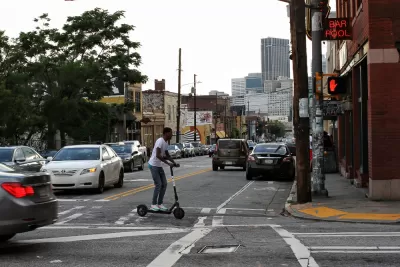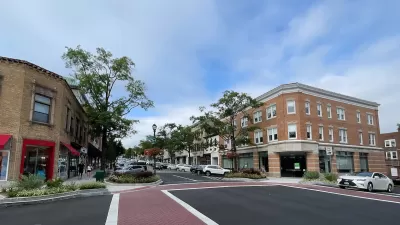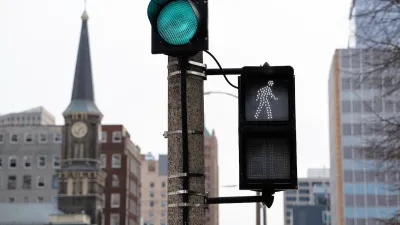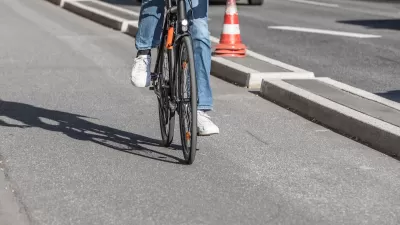The city's department of transportation has released a guide to help community groups implement low-cost 'tactical urbanism' projects.

Atlanta is encouraging community groups to use 'tactical urbanism' interventions to improve pedestrian and cyclist safety at the hyper-local level. As Jason Plautz describes in Smart Cities Dive, "Betty Smoot-Madison, mobility planning director for the Atlanta Department of Transportation, said the tactical urbanism projects are a 'lower-cost and shorter-term' way to meet the city’s overarching goal of 'reimagining and re-engineering our roads around people.'"
'Tactical urbanism' refers to low-cost, temporary, infrastructure interventions by community organizations or other local actors that address street safety, walkability, and mobility issues. The updated guide adds six project options to the city's 2020 tactical urbanism guide: "tactical slip lane closures, demonstration bike lanes, tactical bus stop enhancements, pedestrian space art and lane narrowing." The temporary projects could lead to permanent changes if successful, according to Smoot-Madison.
"The projects also help engage community members around their own priorities; while the city may have to focus on high-traffic corridors and major streets, neighborhood groups have a better sense of the dangers at local intersections that may receive less attention."
Other cities have implemented similar initiatives. "Denver, for example, has launched the vision zero community program to encourage traffic calming and public art. Columbus, Ohio, has used temporary bollards and painting to test design changes at dangerous intersections."
FULL STORY: Atlanta embraces tactical urbanism in Vision Zero initiative

Alabama: Trump Terminates Settlements for Black Communities Harmed By Raw Sewage
Trump deemed the landmark civil rights agreement “illegal DEI and environmental justice policy.”

Study: Maui’s Plan to Convert Vacation Rentals to Long-Term Housing Could Cause Nearly $1 Billion Economic Loss
The plan would reduce visitor accommodation by 25% resulting in 1,900 jobs lost.

Planetizen Federal Action Tracker
A weekly monitor of how Trump’s orders and actions are impacting planners and planning in America.

Waymo Gets Permission to Map SF’s Market Street
If allowed to operate on the traffic-restricted street, Waymo’s autonomous taxis would have a leg up over ride-hailing competitors — and counter the city’s efforts to grow bike and pedestrian on the thoroughfare.

Parklet Symposium Highlights the Success of Shared Spaces
Parklets got a boost during the Covid-19 pandemic, when the concept was translated to outdoor dining programs that offered restaurants a lifeline during the shutdown.

Federal Homelessness Agency Places Entire Staff on Leave
The U.S. Interagency Council on Homelessness is the only federal agency dedicated to preventing and ending homelessness.
Urban Design for Planners 1: Software Tools
This six-course series explores essential urban design concepts using open source software and equips planners with the tools they need to participate fully in the urban design process.
Planning for Universal Design
Learn the tools for implementing Universal Design in planning regulations.
Caltrans
Smith Gee Studio
Institute for Housing and Urban Development Studies (IHS)
City of Grandview
Harvard GSD Executive Education
Toledo-Lucas County Plan Commissions
Salt Lake City
NYU Wagner Graduate School of Public Service





























